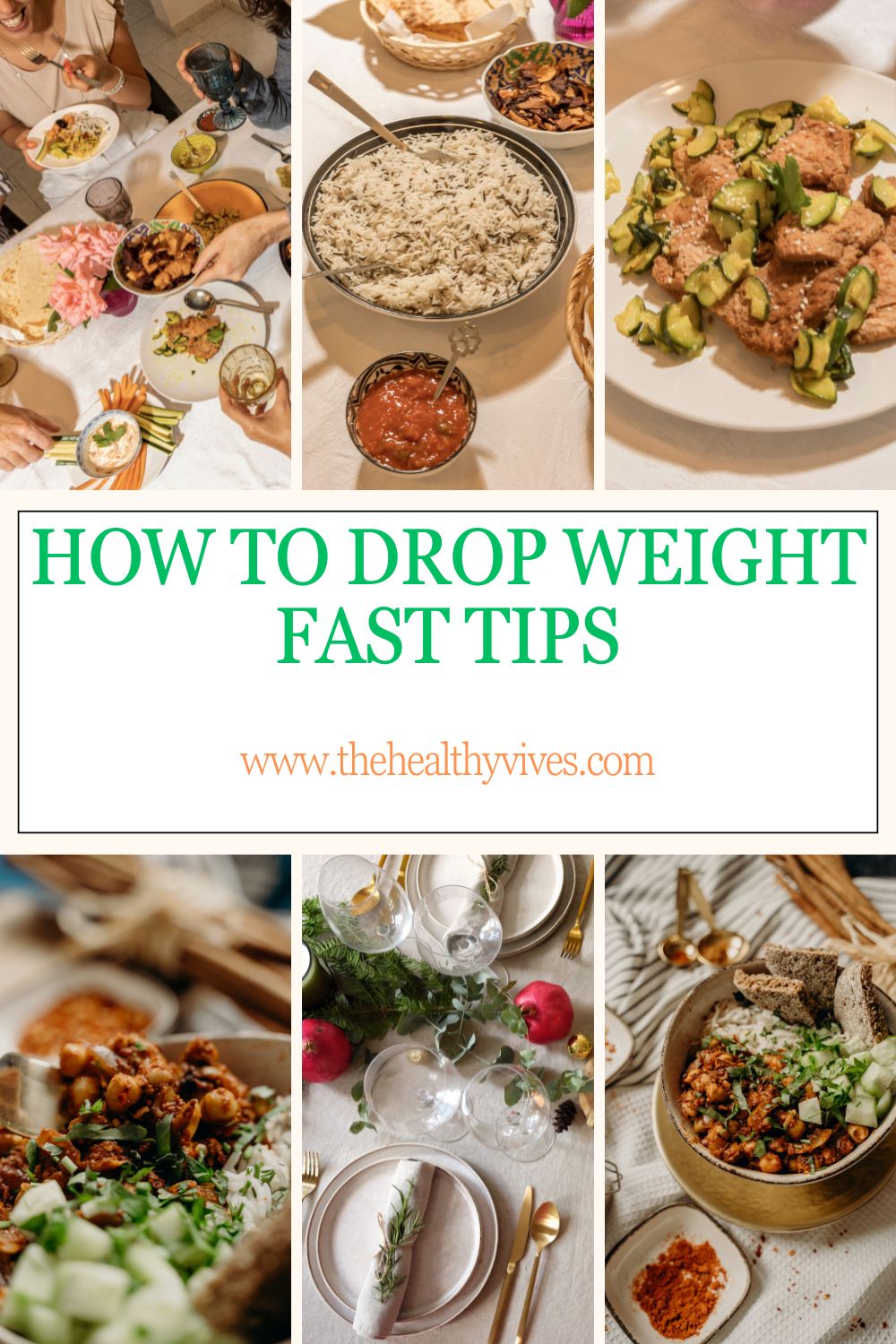
The desire How to Drop Weight Fast Tips quickly is a common goal for many people, be it to prepare for a special event, improve confidence or start a healthy lifestyle. Although quick weight loss is possible, it’s important to do it in a way that prioritizes both your physical and mental well-being.
Balancing speed with health and safety should be at the forefront of any rapid weight loss plan. Successful rapid weight loss requires a disciplined approach and informed choices. It creates a plan that combines effective dietary adjustments, physical activity, and healthy lifestyle habits, tailored to your individual needs. While it’s tempting to look for shortcuts, the most effective and sustainable results come from thoughtful, evidence-based decision-making. In this article, we’ll explore a variety of tips and tricks that can help you achieve your weight loss goals quickly and safely while laying the foundation for long-term health and wellness.
How to Drop Weight Fast Tips
Generally, 1-2 pounds of weight loss per week is considered a healthy and sustainable rate for most people. This range usually involves creating a calorie deficit of 500 to 1,000 calories per day through a combination of diet and exercise. Although it may seem slow, this pace allows your body to adapt, reducing the chance of adverse side effects and ensuring you maintain muscle mass while losing fat. For example, a low-carb diet can cause rapid loss of water weight due to depletion of muscle and liver glycogen stores.
While this can be inspiring, it is important to recognize that these results are temporary and not indicative of long-term fat loss. For long-term success, it’s important to adopt a balanced and sustainable approach that you can maintain beyond the initial weight loss phase.
Effective Dietary Strategies
Here are some of the most effective diet strategies to help you lose weight fast:
Reduce carbohydrate intake
This can help you control your appetite and make it easier to stick to a low-calorie diet.
Increase protein consumption
Satisfaction
Muscle preservation
Metabolism Boost
Cut out sugary and processed foods
They are often loaded with added sugars, unhealthy fats and artificial ingredients that can contribute to weight gain and other health problems.
Portion control
Use small plates
Pre-Party Snacks
Mindful eating
Pay attention to your hunger cues and eat slowly. This allows your body to signal when it is full, reducing the likelihood of overeating.
By incorporating these effective dietary strategies—reducing carbohydrates, increasing protein intake, cutting out sugary and processed foods, and practicing portion control—you can create a balanced and sustainable approach to rapid weight loss. These changes not only support quick results but also lay the foundation for long-term health and weight management.

Quick Workout Techniques
Here are some of the most effective diet strategies to help you lose weight fast:
Reduce carbohydrate intake
This can help you control your appetite and make it easier to stick to a low-calorie diet.
Increase protein consumption
Satisfaction
Muscle preservation
Metabolism Boost
Cut out sugary and processed foods
They are often loaded with added sugars, unhealthy fats and artificial ingredients that can contribute to weight gain and other health problems.
Portion control
Use small plates
Pre-Party Snacks
Mindful eating
Pay attention to your hunger cues and eat slowly. This allows your body to signal when it is full, reducing the likelihood of overeating.
By incorporating these effective dietary strategies—reducing carbohydrates, increasing protein intake, cutting out sugary and processed foods, and practicing portion control—you can create a balanced and sustainable approach to rapid weight loss. These changes not only support quick results but also lay the foundation for long-term health and weight management.
Hydration and Detoxification
Here are some of the most effective diet strategies to help you lose weight fast:
Reduce carbohydrate intake
This can help you control your appetite and make it easier to stick to a low-calorie diet.
Increase protein consumption
Satisfaction
Muscle preservation
Metabolism Boost
Cut out sugary and processed foods
They are often loaded with added sugars, unhealthy fats and artificial ingredients that can contribute to weight gain and other health problems.
Portion control
Use small plates
Pre-Party Snacks
Mindful eating
Pay attention to your hunger cues and eat slowly. This allows your body to signal when it is full, reducing the likelihood of overeating.
By incorporating these effective dietary strategies—reducing carbohydrates, increasing protein intake, cutting out sugary and processed foods, and practicing portion control—you can create a balanced and sustainable approach to rapid weight loss. These changes not only support quick results but also lay the foundation for long-term health and weight management.
Optimizing Daily Habits
Beyond diet and exercise, factors such as sleep, stress management and overall activity levels play an important role in achieving and maintaining weight loss. Here’s how you can optimize these habits for best results:
Quality of sleep
Sleep affects various hormones that regulate appetite, metabolism and energy levels. Here’s why it’s important to prioritize 7-9 hours of sleep each night:
Metabolism and hormonal balance
Less thirst and better food choices
Improved Metabolism
Managing stress levels
Managing stress effectively is crucial to maintaining a healthy weight.
Meditation and Mindfulness
Physical activity
Time Management and Relaxation Techniques
Active lifestyle
Leading an active lifestyle is key to burning extra calories and maintaining weight loss.
Non-exercise activity enhances thermogenesis (NEAT)
More walking and standing
Set activity goals
By incorporating these habits into your daily routine, you can create a more active lifestyle that supports weight loss and overall health.
Bring everything together
Optimizing your daily habits is a powerful strategy for accelerating weight loss and improving overall health. Prioritize good sleep to regulate hormones and improve energy levels, manage stress to prevent emotional eating, and be active throughout the day to increase calorie burn. By focusing on these aspects, you can create a supportive environment for sustainable weight loss and wellness.
Short-Term Dietary Hacks
Here are three effective short-term diet hacks:
Intermittent fasting
This approach can help reduce calorie intake, promote fat loss, and improve metabolic health. Here’s how it works:
How it reduces calorie intake
Aids in fat loss
Popular method
Temporary carbohydrate restriction
Reducing carbohydrate intake for a short period of time can lead to rapid weight loss, primarily through water weight loss.
Loss of water weight
Appetite Suppression
How to apply This technique is best used for short-term results, as prolonged low-carb dieting can lead to nutrient deficiencies and energy imbalances.
Mealtime Tactics
Optimizing meal times can help control appetite, improve energy levels, and reduce fat. Here are some effective mealtime strategies:
Eat a protein-rich breakfast
Avoid late-night eating:
Time around the workout
These mealtime strategies, when combined with a balanced diet, can help you maintain energy levels, control appetite, and optimize your metabolism.
However, they should be used as part of a comprehensive, balanced approach to health and nutrition. Remember that while these hacks can jumpstart weight loss, long-term success requires sustainable habits and a balanced diet.

Avoiding Common Pitfalls
Understanding these common issues can help you make safer, more effective choices. Here are some of the biggest mistakes to avoid:
Crash diets
Nutritional deficiency
Muscle wasting
Rebound Weight Gain
Exercising excessively
Increased risk of injury
Burnout and fatigue
Negative effects on hormones
Unverified supplements
Health Risks
Lack of effectiveness
Misleading Marketing
Avoiding these common pitfalls requires a conscious and informed approach to weight loss. Here are some tips to help you stay on track:
Set realistic goals: Aim to lose 1-2 pounds per week. This speed is more sustainable and reduces the risk of negative health effects.
Listen to your body: Pay attention to hunger and fullness cues and make sure you’re not pushing yourself too hard with exercise. Rest is just as important as activity in any fitness plan.
Focus on overall health: Instead of aiming for a number on the scale, focus on improving your overall health. Eating a balanced diet, being active and managing stress are key components of a healthy lifestyle.
Seek professional guidance: If you’re unsure about losing weight safely or considering a supplement, talk to a health care provider or dietitian. They can provide personalized advice and help you create a plan that works for you.
By avoiding extreme diets, excessive exercise, and unproven supplements, you can lose weight in a way that is both effective and safe, leading to long-term success and improved wellness.
Consulting with a Professional
Here’s why consulting a professional is so important and how it can benefit your weight loss journey:
Ensuring safety and health
Rapid weight loss methods can carry risks, especially if they include extreme dietary restrictions, intense exercise, or unproven supplements. This is especially important if you have pre-existing medical conditions, such as:
Diabetes
Heart conditions
Thyroid problems
Personalized plan for optimal results
Helpful Dietary Advice
Customized exercise routine
Behavioral and lifestyle support
Monitoring progress and adjusting plans
Adjusting caloric intake
Changing the exercise routine
Address plateau
Psychological and emotional support
Overcome obstacles
Developing a healthy relationship with food
Avoid misinformation and dangerous fads
Fad Diets
Unverified Supplements
Conclusion:
One of the best investments you can make is to consult with a healthcare provider or dietitian before starting a rapid weight loss program.
Build your health. Professional guidance ensures that your weight loss regimen is safe, effective and tailored to your unique needs. It provides the support and knowledge you need to transform short-term results into long-term success. By prioritizing your health and seeking expert advice, you set yourself up for a healthier, more sustainable weight loss journey.
Conclusion
In our quest to lose weight fast, we explored various effective tips and tricks that can help you lose weight fast, emphasizing the importance of doing it safely and sustainably. Here’s a summary of the key takeaways
Set realistic expectations: Aim for a safe rate of weight loss (about 1-2 pounds per week) to ensure long-term success.
Effective dietary strategies: Focus on reducing carbohydrate intake, increasing protein consumption and eliminating sugary and processed foods to create a calorie deficit.
Quick Workout Techniques: Incorporate high-intensity interval training (HIIT), strength training, and cardio exercises to burn maximum calories.
Hydration and Detoxification: Stay hydrated and consider temporary detox methods to reduce bloating and lose weight.
Optimizing Daily Habits: Prioritize sleep quality, manage stress levels and incorporate more movement into your daily routine for better overall health.
Short-Term Dietary Hacks: Use intermittent fasting, temporary carbohydrate restriction, and mealtime strategies to optimize your weight loss efforts.
Avoid common pitfalls: Avoid crash diets, excessive exercise and unproven supplements to protect your health and maintain progress.
Consult a professional: Seek guidance from a healthcare provider or dietitian to create a personalized, safe weight loss plan tailored to your unique needs.
While the desire way to lose weight quickly is common, balancing speed with safety and sustainability is crucial. Quick fixes can be tempting, but they often lead to unsustainable habits that compromise your health and well-being.
It’s about adopting healthy habits that support your overall lifestyle. This holistic approach ensures that you not only achieve your weight loss goals but also maintain them for years to come.
May you embrace your journey, celebrate your progress, and always keep your long-term health in mind as your ultimate goal.

